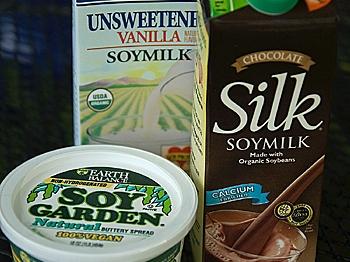Do you eat soy for all its health benefits? The aisles of many health food grocers can sometimes seem like shrines dedicated to tofu, soymilk, soy bars, and more. Perhaps more than any other health food, soy is marketed as the healthiest new food product in the new millennium. But contrary to common belief, there are many potentially detrimental health problems associated with soy.
A lot of media attention has highlighted the benefits of soy, however, much of the research backing those claims have been funded by soy manufacturers, and therefore it is important to consider other points of view when it comes to whether soy is beneficial or not.
Certified clinical nutritionist Carol Simontacchi reports in her book Crazy Makers: How the Food Industry is Destroying Our Brains and Harming Our Children, that soy is “one of the most common offenders of food allergies and food intolerances.” Endocrine researcher and nutritional consultant Raymond Peat calls it “odd that the soybean should be singled out,” as the source of health in Japanese culture. Peat is an expert on female hormones, and in his book “From PMS to Menopause: Female Hormones in Context,” he attributes the menopausal health of the Japanese to other factors, not soy. Studies released in 2005 prompted the American Heart Association to stop recommending soy for heart disease.
Nutrition researcher and author of Nourishing Traditions, Sally Fallon refers to soy as a “questionable food,” and suggests: “Soy protein isolates are high in mineral-blocking phytates, thyroid-depressing phytoestrogens, and potent enzyme inhibitors that depress growth and cause cancer.”
This doesn’t sound like the health food we’ve been told about, does it? Can these statements really be true?
Soymilk is one of today’s most highly acclaimed health items despite Fallon’s reports that soymilk has a high phytate content that can lead to mineral deficiencies. Unfermented soy products contain a natural protein called phytic acid (phytates), which nutritionist Simontacchi reports is actually “classed as an anti-nutrient because it blocks the absorption of minerals, especially calcium, zinc, and magnesium.” Simontacchi says, “All three minerals play a crucial role in brain health.”
Perhaps tofu has more health benefits than soymilk, but in 2008, an epidemiological study reported that those who had a “high tofu intake,” had “an increased risk for cognitive impairment and other dementia markers.” A 2001 literature review correlated these results, saying, “Disturbing data have been reported on potential negative effects of soy isoflavones on cognitive function in the aged, particularly relating to tofu intake.”
Soy protein powders are extremely popular as basic ingredients in many “health food” bars and “healthy” main courses, like Luna Bars, Cliff Bars, GeniSoy, soy cheeses, and soy burgers. Sally Fallon reports, “These protein isolates are usually obtained by a high-temperature process that over-denatures the proteins to such an extent that they become virtually useless while increasing nitrates and other carcinogens.” Not only does this mean that the “complete amino acid profile,” used to sell these vegetarian food products may be “useless,” but carcinogens are known cancer-causing agents. What’s going on here?
Even soy-based infant formulas are under tremendous scrutiny. In Crazy Makers, Simontacchi accounts, “Infants on soy formula may receive the equivalent amount of estrogen that is found in five to ten birth control pills each day.” She discusses how this is especially devastating for little boys whose first six months of testosterone production is responsible for most of his programming to be a man. These are quite disturbing facts for anyone serving soy to their infants.
‘Soybeans must not be used like other legumes in soups and other dishes but only as fermented products like miso, natto, and tempeh,” said nutrition researcher Sally Fallon.
Most of us assume that healthy cultures have eaten soy as a staple for thousands of years when that may not be the case. Fallon states, “Those who wish to eat tofu would be wise to imitate the Japanese who eat small amounts of tofu in fish broth and not as a substitute for animal foods.”
There are three components of soy that make it a “questionable food,” as it is referred to by Sally Fallon. Phytates, or phytic acids, are found in all unfermented soy foods, like soymilk, soy bars, and tofu. These “anti-nutrients,” can cause mineral deficiency according to both Fallon and Simontacchi.
Also found in unfermented soy are enzyme inhibitors which block enzymes, cause cancer, and cause protein digestion problems, according to Fallon. This is particularly startling news for the vegetarians who thought soy made their lives simple.
Even if soy has been fermented, it still contains antioxidant isoflavones that act like the hormone estrogen in your body. This is the reason women at menopause may feel less symptoms. But at what cost?
Fallon says isoflavones depress the thyroid, which slows your metabolism and causes weight gain, fatigue, dry hair, hair loss, dry skin, irritability, and many other symptoms. In addition, the 2001 review reported “a potential role for soy isoflavones in inducing chromosomal changes in your cells.”
Far from fighting cancer, this finding adds weight to Fallon’s claim that the enzyme inhibitors actually cause cancer. Both the 2008 study and the 2001 review report cognitive impairment, dementia, and memory loss associated with soy isoflavones. This is not exactly growing old gracefully, is it?
Fallon’s research also indicates that phytoestrogens are potent endocrine disruptors as well. Researcher Robin Mackar agrees, saying, “There is a growing body of literature demonstrating the potentially adverse consequences [of soy] on the reproductive system.” Especially for young women who want children and non-menopausal women who desire optimal hormonal health, endocrine disruption is not a welcome side effect.
Remember, ancient wisdom may suggest eating soy in small amounts. If you are worried about the reports of decreased thyroid depression, endocrine disorder, cognitive impairment, dementia, memory loss, and cancer formation, you may want to maintain a far distance even from fermented soy products.
James Goodlatte is the founder of Fit For Birth, Inc., and a Pre & Post Natal Holistic Health Coach. His passion is to heal families by inspiring the use of natural methods and by building a team of fitness professionals to reduce infertility, avoid mechanized childbirth, and lower chronic disease in our infants. Fit For Birth provides continuing education courses for fitness and birth professionals, as well as various personal training and health coaching programs for pre and postnatal women.
For more information, please go to www.GetFitForBirth.com.
Like us on facebook.com/GetFitForBirth
Follow us on Twitter @FitForBirth





